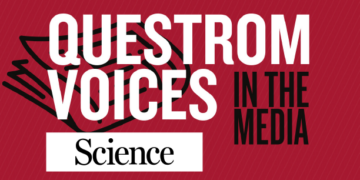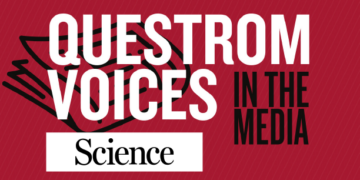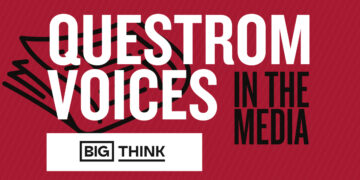What inspired you to synthesize the literature on gender bias in science academia?
At the turn of the century, women represented far less than half of people studying and working in the sciences, and particularly in physical sciences and engineering, with 38% of new PhDs and 32% of faculty in 2000 being women. This captured the attention of many, including the National Academy of Sciences and the National Science Foundation, as well as many social and natural scientists. Since the year 2000, more than 15,000 scholarly articles have been written on the topic of women in academic science. It is assumed by many authors of these articles that the under-representation is due to gender bias. In fact, a large proportion of the articles are written to document specific cases of bias – in specific universities, grant programs, etc. Yet despite there being so many articles, the same handful of studies showing bias continue to be cited by many of the 15,000 articles. I, along with two psychologists who worked with me in a high cited 2014 article (Ceci, Ginther, Kahn and Williams 2014) decided to synthesize what we learn about gender bias from this vast literature. We chose to focus on a limited number of evaluation points in academic scientists’ careers post-PhD – hiring into tenure track jobs, grant applications’ success, journal submissions’ acceptance, letters of recommendations (for applicants to entry tenure-track jobs), and teaching evaluations – and compiled all of the evidence of gender bias in those fields, using typical meta-analytical techniques to identify articles. The result was “Exploring Gender Bias in Six Key Domains of Academic Science: An Adversarial Collaboration.” Psychological Science in the Public Interest (2023).”
Why did the article’s title call this an adversarial collaboration?
I have written numerous articles documenting gender bias in hiring and promotion in my field of economics. Steve Ceci and Wendy Williams have written numerous reports showing gender-fair hiring. We wondered if the three of us could resolve our differences – which some may consider our personal biases – and if so, what would we find.
Why were the WSJ and other (mostly conservative) outlets interested in your research?
On April 30, the Wall Street Journal electronically published an editorial entitled “Women in Science Are Doing All Right” with the subtitle, “A new study challenges the notion that sexism is rampant in the sciences.” I am sure they were interested because our findings ran against the popular beliefs of the prevalence of bias. Our results contradicted the claim of bias in several of the evaluation points we studied.
First, women PhD scientists who applied for academic tenure-track jobs during the period 2000-2020 were either equally or more likely than men to be hired. Second, in the US, women who applied for grants (mostly to the NIH or the NSF) were as likely as men to receive them. Third, women’s submissions to scholarly journals were similarly likely to have their submissions accepted for publication. Fourth, letters of recommendation for STEM academic tenure-track jobs had on average similar positive and negative aspects (standout words, agentic, doubt-raisers, grindstones) when written for men and women. While we did find an average 18% salary gap between academic men and women, accounting for seniority, academic rank, field, weekly hours worked, and university type (research-intensive, undergraduate only etc.) and the gap was only 7% and further accounting for research publications the gap was only 4%. Students’ teaching evaluations of women were extremely negative and often would be considered sexist, and there was a 7% (1/7 percentage point) unexplained gender gap in grant funding success in Europe.
Of course, our findings are about the average gender differences. This does not mean bias is absent in every institution or in every field. For instance, the gender bias and out-and-out harassment in my own field of economics has not disappeared.
If there is no bias in academic tenure-track hiring, grant funding and journal acceptances, why is the percentage female among new tenure-track professors so much lower than among science PhD recipients? Why are females still so under-represented among NIH and NSF grantees and grant dollars, and why do women PhDs have so many fewer publications than men of similar vintage?
There are so few women among the new hires because far fewer women than men apply for these jobs. (When women do apply for tenure-track jobs they are actually hired at an equal rate as comparable men or even at a higher rate.) People who believe that there is very little gender bias in general might conclude that women simply don’t want to be in academia. My response to that, based on my knowledge of the literature, is that blaming women’s lower application rates on preferences ignores the systemic disadvantages that women face in pursuing scientific academic careers. As I said in my response to the WSJ journal editorial (WSJ 5/4), the major reason that women PhDs don’t apply to these jobs is that they look ahead to the 4-5 years of postdocs required for these jobs and the 6-year deadline to develop the publications necessary to get tenure, compare it to their biological clocks ticking away, and choose instead either industry, government or non-tenure-track academic jobs (such as staff scientists). The problem is the rigid structure of academic careers that developed in an era when practically all PhD scientists were men.
The fewer numbers of women in science academic entry-level tenure-track positions leads to gender differences in grant applications and journal submissions as well. However, the literature shows an additional reason for women’s lower incidence and size of grants: women are less likely to reapply for grants that have been rejected, or to apply for renewal of previously-funded grants, than men, and women ask for smaller dollar amounts of grants. Here, some of the blame lies with the women – myself included – for not having men’s self-confidence about their chances for success. Or should I fault the men for being (often irrationally) optimistic about their chances?
What can women who wish to pursue scientific careers learn from this research?
Put simply, women who want to apply for tenure track jobs should not be afraid they will be passed over. Similarly, women in the US can be assured that their grant applications and journal submissions will be fairly evaluated.
However, women should also seriously think about whether they can do equally interesting and important research outside of tenure-track academic jobs. (For an example of a successful scientist who did not start in tenure-track academia, look up the career path of Emmanuelle Charpentier, who shared the Nobel Prize for the invention of CRISPR.)
What can university and departmental leadership, and scientific field organizations learn from this research?
I wish I had a clear model that all universities can follow for the ideal academic career ladder that could accommodate women’s biological clocks while ensuring that the very best enter and remain in science and yet not explicitly introducing gender into policies. One example of something that didn’t work is discussed in an interesting article (Antecol, Bedard, Stearns, American Economic Review 2018) that studied effects of gender-neutral maternity/paternity leave policies which lengthened the period from hire until tenure review (in 50 economics departments over 25 years). They found that the policy led to lower likelihoods for women to receive tenure but higher ones for men (because women devoted the leave time to caring for their child, while men used it to do more research). Clearly, we need many more experiments into how to best utilize women’s scientific knowledge and ensure that science students have many female role models and mentors. (My personal favorite is to hire and promote academics based on their accomplishments and promise of future accomplishments irrespective of their age or career stage.)
What should funding agencies learn from this research?
In terms of the NSF and NIH, all I can say is “Good for you. You recognized an issue, you figured out ways to ensure that review is bias-free, and please share some tips with European and Canadian funding agencies.” For funding agencies outside the US, my advice is that they ask the NSH and NIH for tips on how to achieve equity.
What can employers outside of academia hiring scientists learn from this research?
The evaluation points where we found no gender bias have several things in common, and this dovetails with the insight made by Koch, D’Mello and Sackett in their 2014 meta-analysis of gender bias in the experimental literature on (general) employment decision-making (Journal of Applied Psychology). That article found that gender bias was greatly mitigated when first, there is substantial clear information about the qualifications of the candidate applying for a job, and considerable agreement among the evaluators on the ideal qualifications; second, when those making the decision were highly motivated to make the best decision (and therefore relied heavily on the information); and finally, when the people making the decisions were experienced in making these same kinds of decisions. The more employers can incorporate these same features in their hiring and promotion decisions, the less their decisions will be based on bias of any kind.
Employers of scientists can learn something additional: There are a lot of really excellent scientist women out there who are eschewing the academic career ladder. Take advantage of them!
























